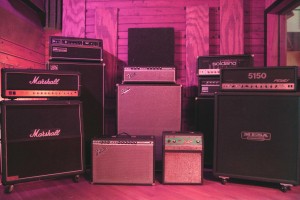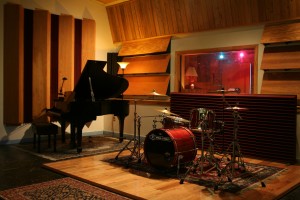 June 27, 2011
June 27, 2011 TrueDIY Tech: Session Checklist For Engineers
An article was recently published on this site outlining the best ways for bands to prepare before their time in the studio. We thought it would be beneficial to provide a similar checklist for those doing the recording — the engineers! written by: Joe Mahoney
Being unprepared and unorganized for a studio session as an engineer is just as bad as if the drummer somehow forgot to bring his entire kit. It’s a rookie mistake, and as we all know, a successful engineer/musician relationship begins with first impressions. To help any aspiring engineers out there, we’ve compiled a quick and simple checklist highlighting a few small things one may forget to do before the band shows up at the door.
Run Your Own Background Check
 No, I don’t mean researching whether your clients are convicted felons (however if they are, it would make for a good story). Running a background check on your client simply means finding out who they are, and where they have been musically. Knowing this information shows the client you’ve developed a plan specifically tailored to them, and lets them know you mean business. Beware however, your approach to a project will vary dramatically between a band who has had three gold records and a band who is creating their first album with an outside producer, so leave room to be creative.
No, I don’t mean researching whether your clients are convicted felons (however if they are, it would make for a good story). Running a background check on your client simply means finding out who they are, and where they have been musically. Knowing this information shows the client you’ve developed a plan specifically tailored to them, and lets them know you mean business. Beware however, your approach to a project will vary dramatically between a band who has had three gold records and a band who is creating their first album with an outside producer, so leave room to be creative.
This includes carefully listening to any past recordings the artist may have done. Some bands will look for a sound similar to their past records while others are looking to you for something fresh and unique. Of course, they’re also interested because of what you bring to the table as a producer and engineer. Try and define their reasoning for choosing you the best you can. Many studio professionals are hesitant to ask these questions because they feel it’s something they must already know before working with the band, but that’s not the case. No one is going to be offended if you’re a little inquisitive, in fact it might even show them you care more than others. You are only setting yourself up for success.
Starting With A Clean Slate
Your studio looks immaculate whether it’s in your basement or commercial building. At the bare minimum, you should make sure it doesn’t look like a college frat house. By setting the tone early, the band will see how the studio’s supposed to look when they arrive.
Everything should begin at square one, on day one. No assumptions, no jumping the gun. Your first day is going to be a test of both your abilities as an engineer and your personality. Naturally, the same goes for the client. Judge their demeanor once they have arrived. If they are nervous or shy, break the ice! Do something stupid and get the clients laughing. An engineer and producer should be friends with the band prior to ever pulling up any faders. In 2006, I worked with a band that was recording their debut release for a major label. The bass player was getting upset with the progress of the record and decided to throw a fit instead of coming to us. We were hired to do 12 songs in 30 days. To an engineer it’s doable, but still a tall order. The bass player decided to call the manager one day and tell him that myself and the other engineer were taking a lot of breaks when we should be cracking away at the record all day. In reality, we were recording 17 hours a day which is insanely taxing on your ears, making breaks necessary. In the end, we asked for 4 extra days to mix. Our request was declined and we had to mix 12 songs in 3 days. The moral of the story? Keep your eyes open and resolve issues within the walls of the studio before it moves out to management, labels, or any individual helping to finance the record. The issue I had to deal with could have been a minor fix, but because I wasn’t vigilant we lost the chance to spend the correct amount of time mixing.
 Zing Recording Studios
Zing Recording Studios
Once the band has settled in and things move into the live room, make sure nothing is setup just yet. Leave all the mics, cables, and stands where they belong. Don’t assume that the record will begin with drums or whatever your traditionally preferable starting point is. Perhaps the band wants to setup to track some rough tracks live or do guitar and vocal scratch tracks before drums. Take it one step at a time and let the client lead you through the beginning of the session until you understand their methods and plan of attack. Once you feel you have a strong grasp on what it is the client is trying to create, then it’s OK to step out front and lead the way.
If You Don’t Take Notes, You’re Screwed!
This should really go without saying but there are hundreds, if not thousands of engineers who do not keep detailed notes of the session. You are setting yourself up for failure if you do not take notes. Thorough note taking will be your best friend when issues with your computer arise (and I assure you, they will). Think of your note journal as a diary. Mine includes notes on each take, using shorthand to identify excellent takes compared to bad takes. They also may include great one-liners by clients, notes on where to find the worst take that can be used to embarrass the singer in front of the rest of the band, and input lists detailing what instrument is recorded by what mic, passed through which preamp, through which compressor, and finally into which channel in my Digital Audio Workstation. Know your chains for worst-case scenarios.
In the end, your notebook should fill quite fast. If you wonder whether or not your notes are detailed enough just ask yourself one question: Do my notes paint a vivid picture of the session from start to finish? If you would rather keep a laptop handy to pop some notes into a word document, do it. As long as you can bring everything back to where it belongs after something goes wrong…
Keeping these steps in mind before a session will help make for a smooth transition for the client as well as showcase your professionalism. There are tons of other processes to prepare for a session, these are just a few important ones. Just remember to ALWAYS keep an open mind because one day you might have a timid singer-songwriter in your studio and by the next, you may have Cabbage, the 5-foot bass player from the band Murder.
Post your pre-session steps in the comments if you have some good ones that everyone should keep in mind!
-Joe






Reader Comments (2)
I love the fact that you mentioned being friends with the band and looking into them beforehand. I've known bands who went into a studio with an engineer who knew nothing about them, and was a complete jerk to them. When you make friends, the atmosphere is much more relaxed, it builds trust and understanding. Good post.
Hey Riley!
Honestly, I have been in the position as an engineer who did his research and one who didn't. It makes all the difference. Not only should your engineer enjoy the music you play, but also enjoy the people who are playing it. In the long term, this is the best way to build trust between the engineer and the band so the band is confident their engineer is striving to give them the best product possible! Thanks for commenting!
-Joe Mahoney